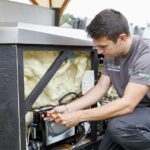We can all agree that sleep is the most important component of our metabolism and is absolutely necessary for the proper functioning of the brain and other organs. But people that suffer from sleep apnea find it difficult to pick up a good sleeping routine, and as a result, they frequently suffer from cognitive decline, which can lead to serious brain damage. This also includes a variety of other health issues, including high blood pressure, stroke, heart failure, and even diabetes.
Sleep apnea causes the muscles in your mouth to relax, obstructing the aperture of your throat and preventing normal airflow. Obstructive sleep apnea causes you to stop breathing for short periods of time during the night, forcing you to snore, gasp for air, or wake up with a dry mouth, which will irritate both you and your spouse. If you have this condition and are suffering from loud snoring at night, you should seek effective treatment as soon as possible.
There are several therapies available for obstructive sleep apnea. One particular therapy includes sleeping with a gadget that employs positive pressure to keep your airway open, and a mouthpiece that pushes your lower jaw forward as you sleep is another possibility. This type of medical device is called a CPAP machine for sleep apnea.
What Is a CPAP Machine and How Does It Work?

Continuous positive airway pressure treatment involves the use of a machine to assist a person in breathing more comfortable while sleeping. A CPAP machine raises the pressure in your throat, preventing your airway from collapsing as you breathe in. This is a type of sleep therapy that uses a mask to provide softly pressured air to help you breathe better.
If you want to buy a CPAP machine for sleep apnea, you should consult a doctor and a CPAP provider first to ensure you have a properly fitting nasal and mouth mask. Because everyone’s face shape is different, the same design and size mask for someone else may not be suitable for you at all. Your doctor or manufacturer will prescribe a CPAP mask based on a variety of criteria, including the way you breathe, the amount of pressure you require, and your usual sleeping position. With these and some other helpful tips for buying a CPAP machine, you’ll be able to find a mask that is both comfortable and appropriate for your face.
As you’re getting started using the CPAP machine, first try and wear the nasal mask without turning on the machine. Breathe without any air coming through your nose to get used to it easier. Once you decide to try it out, compressed air will be forced through the mask to flow in your nasal cavity. If you can hear air escaping, it’s an indication that you need a tighter seal. It is always recommended to begin with low-pressure airflow and gradually raise the air intensity for your demands.
The sleeping posture is also important for ensuring that the gadget works properly. Experiment with a few different sleeping positions to find the ones that are both comfortable for your body and ones that do not interfere with your ability to wear the mask.
What’s the Difference Between CPAP, APAP, and BiPAP Machines?

Positive airway pressure devices come in a variety of forms and options to meet the individual demands of patients. Other CPAP alternatives are the APAP and BiPAP breathing machines.
An APAP (automatic positive airway pressure) machine is a device that employs a pressure range that self-regulates during the night based on your breathing needs. This machine continually monitors your breathing pattern throughout the night and automatically adjusts the pressure depending on your sleep position.
BiPAP (Bi-level positive airflow pressure) machines use one pressure during inhalations and another during exhalation. This type of machine is used for those who are unable to utilize CPAP equipment or have elevated carbon dioxide levels in their blood. For individuals with central sleep apnea, BiPAP devices can additionally have a backup respiratory rate.
Health Benefits of Using a CPAP Machine and Possible Side Effects
The health benefits while using the CPAP machines are major. While you sleep, these devices provide a constant flow of oxygen to your body, and as a result, they help with the short breathing disruptions. Positive pressure therapy reduces your risk of cardiovascular disease and boosts your energy levels, so your brain will thank you for that.
While the numerous health benefits are being discussed, each gadget has a few drawbacks that you should be aware of. If you experience difficulty when falling asleep, this may not be the ideal form of treatment, since CPAP devices tend to produce a fan sound when turned on. The CPAP masks may cause dry mouth as well as nasal congestions, that you may not easily get used to.
Other Relief Solutions for Sleep Apnea
Most individuals find it difficult using a CPAP device. The mask may be unpleasant, the sensation of pressured air may be disturbing, and noise from the device may be distracting. If you are unable to purchase a CPAP device or another type of machine for sleep apnea for whatever reason, or if you simply dislike the sound of using a device for sleeping, you can seek relief through other means.
Maintaining a healthy weight can help keep your airways open and reduce the symptoms of sleep apnea. As said before, it is known that people with weight issues can experience an incidence of sleep apnea, so a little weight loss can remove the need for these machines.

Don’t be surprised when you hear that sleep positions play a huge role in the quality of sleep you get. Changing your sleeping posture can lessen the sleep apnea symptoms and improve your night’s sleep. For instance, sleeping on your back is most likely to trigger a sleep apnea episode, so the best way to avoid that is to sleep on your side.
There are many other lifestyle changes can contribute to fewer sleep apnea symptoms, such as quitting drinking and smoking tobacco. This is because alcohol relaxes the muscles in your throat that govern your breathing, which results in snoring and a disrupted sleep pattern. And tobacco usage can cause inflammation and swelling in your airways that might aggravate your snoring and sleep apnea.


